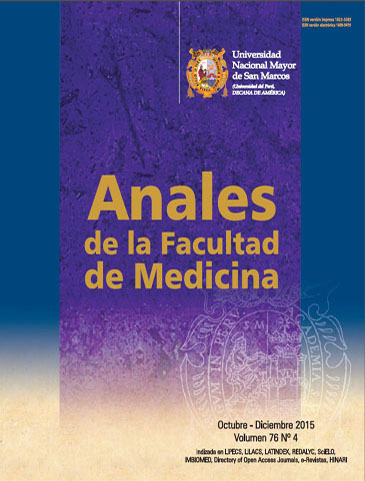Clinical progression of autoimmune thyroiditis in children and adolescents treated at the Instituto Nacional de Salud del Niño
DOI:
https://doi.org/10.15381/anales.v76i4.11401Keywords:
Thyroiditis, Autoimmune, lymphocytic, Hashimoto Disease.Abstract
Introduction. Autoimmune thyroiditis is the most common cause of hypothyroidism in children. Clinical diagnosis depends on biochemical condition and monitoring is essential to adopt therapeutic measures and ensure proper growth and development. Objective. To describe the clinical progression of autoimmune thyroiditis in children and adolescents. Design. Retrospective, longitudinal series of cases study. Setting. Department of Endocrinology, Instituto Nacional de Salud del Niño, Lima, Peru (a teaching institution). Participants. Children and adolescents suffering of autoimmune thyroiditis. Interventions. Sixty-five patients -58 women and 7 men- under the age of 18 suffering of autoimmune thyroiditis and admitted between 2000-2012 were followed with clinical and biochemical evaluations over one year; carriers of genetic syndromes or with type 1 diabetes mellitus were excluded. Main outcome measures. Clinical progression of autoimmune thyroiditis. Results. Goiter (78.5%) was a predominant sign and risk factor for development of acquired hypothyroidism in those who debuted with subclinical hypothyroidism. At admission 48% of prepubescent infants presented thyroid dysfunction compared with 26.6% of pubescent subjects. Out of the total population 46% suffered of acquired hypothyroidism, 26% subclinical hypothyroidism, and 23% were euthyroid; 27% of euthyroid patients and 47% of subjects with subclinical hypothyroidism evolved into acquired hypothyroidism. There was no statistically significant difference in the mean Z score for height or BMI at diagnosis nor during follow-up. Conclusions. Children and adolescents with autoimmune thyroiditis debuting as euthyroid or with subclinical hypothyroidism had a high risk of developing acquired hypothyroidism. It seems important to monitor thyroid function for timely initiation of hormone replacement therapy.Downloads
Published
2015-12-31
Issue
Section
Artículo Original
License
Copyright (c) 2015 Oswaldo Núñez Almache, Carlos Del Aguila Villar, Eliana Chavez Tejada, Oscar Espinoza Robles, Paola Pinto Ibárcena, Martha Calagua Quispe, Miguel De los Santos La Torre

This work is licensed under a Creative Commons Attribution-NonCommercial-ShareAlike 4.0 International License.
Those authors who have publications with this magazine accept the following terms:
- Authors will retain their copyrights and guarantee the journal the right of first publication of their work, which will be simultaneously subject to Creative Commons Attribution License that allows third parties to share the work as long as its author and its first publication this magazine are indicated.
- Authors may adopt other non-exclusive licensing agreements for the distribution of the version of the published work (eg, deposit it in an institutional electronic file or publish it in a monographic volume) provided that the initial publication in this magazine is indicated.
- Authors are allowed and recommended to disseminate their work over the Internet (eg: in institutional telematic archives or on their website) before and during the submission process, which It can produce interesting exchanges and increase quotes from the published work. (See El efecto del acceso abierto ).
How to Cite
1.
Núñez Almache O, Del Aguila Villar C, Chavez Tejada E, Espinoza Robles O, Pinto Ibárcena P, Calagua Quispe M, et al. Clinical progression of autoimmune thyroiditis in children and adolescents treated at the Instituto Nacional de Salud del Niño. An Fac med [Internet]. 2015 Dec. 31 [cited 2025 Jun. 3];76(4):325-31. Available from: https://revistasinvestigacion.unmsm.edu.pe/index.php/anales/article/view/11401



